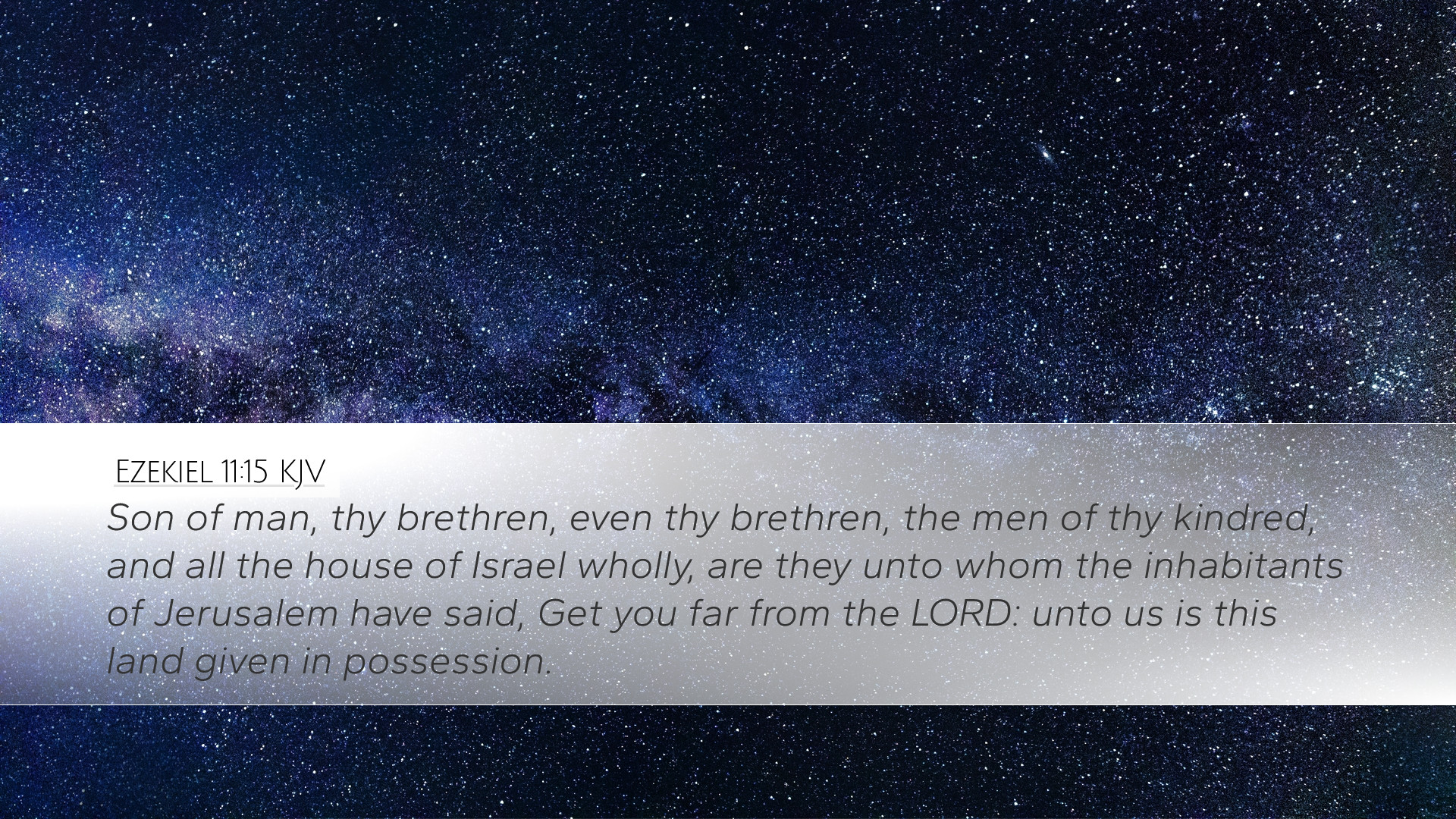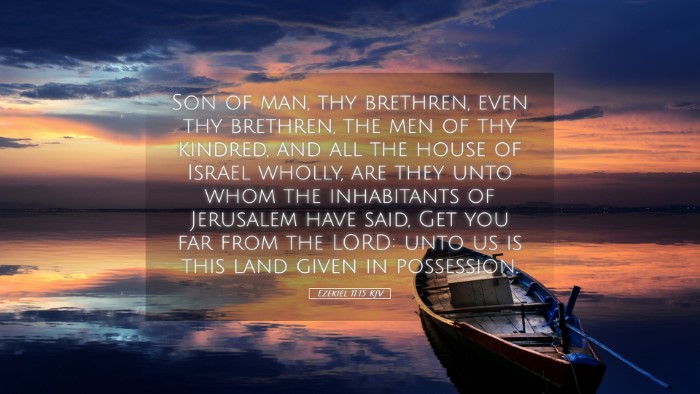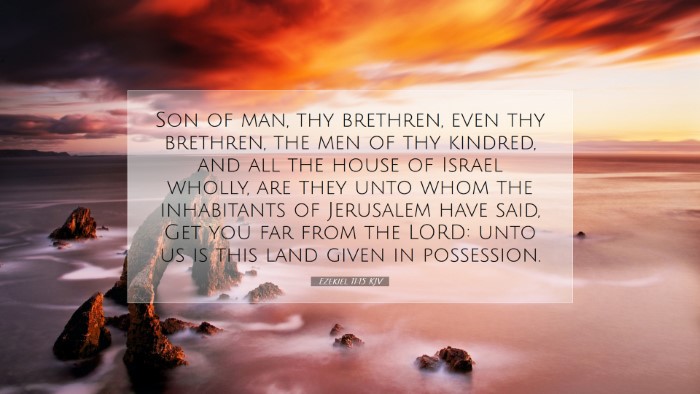Commentary on Ezekiel 11:15
Bible Verse: Ezekiel 11:15 - "Son of man, your brethren, even your brethren, the men of your kindred, and all the house of Israel, wholly are they to whom the inhabitants of Jerusalem have said, Get you far from the LORD: unto us is this land given in possession."
Context and Historical Background
The book of Ezekiel is a prophetic work attributed to the prophet Ezekiel, who ministered during the Babylonian exile. Ezekiel’s prophecies often address the themes of judgment, restoration, and the sovereignty of God. In Ezekiel 11, the prophet is addressing the exiled Jews who lived in Babylon, particularly focusing on their relationship with the Jewish remnant in Jerusalem. This verse reveals the sentiments of the inhabitants of Jerusalem towards those in exile, suggesting a profound sense of division and alienation among the people of Israel.
Exposition of the Text
Ezekiel 11:15 serves as a crucial point in emphasizing the perceived separation and rejection experienced by the exiled Jews. This verse reflects both literal and metaphorical implications of distance and disconnection from God's favor. It highlights the discouragement stemming from the attitudes of the Jerusalemites who viewed themselves as having a superior claim to the land and favor of the Lord.
Insights from Matthew Henry
Matthew Henry notes that this verse illustrates the bitter feeling of those who were in exile, emphasizing their connection to their brethren left in Jerusalem. He observes that the inhabitants of Jerusalem had taken a stance that implied exclusion from God’s promises, showing a lack of understanding of God’s grace, which is not bound by geographical or communal lines.
Henry further interprets this as a prophetic word of hope, framing Ezekiel's message as one that challenges the arrogance of the residents of Jerusalem while simultaneously comforting those who find themselves marginalized in exile. The concept of “possession” is not merely physical land but also spiritual heritage and identity in God.
Thoughts from Albert Barnes
Albert Barnes expands on the social and spiritual dynamics at play in this verse, emphasizing the pain of exclusion experienced by the exiles. He points out that such statements from the people of Jerusalem reflect a tragic misunderstanding of God’s covenant and the nature of His relationship with Israel. Barnes observes that claiming the land does not automatically equate to divine favor, and the division implies moral and spiritual consequences.
Barnes also makes a strong case for understanding God's overarching plan for Israel, which includes reconciliation and restoration. He indicates that even though the exiles are deemed unworthy by their brethren, God's promises transcend human judgments, preparing for a future where inclusiveness will be a hallmark of His redemptive work.
Reflections from Adam Clarke
Adam Clarke approaches this verse with an emphasis on its theological implications. He draws attention to the historical context wherein the exiles were being dismissed by those in Jerusalem. Clarke elaborates on the notion of community and covenant, affirming that God's chosen people should not be divided by geographical or socio-political differences.
Clarke's commentary underscores the importance of recognizing the broader body of believers, encouraging unity despite separations. He also identifies the dangers of spiritual elitism and self-righteousness, which cloud the judgment of those who think themselves closer to God simply by virtue of location or status.
Applications for Today
The teachings in Ezekiel 11:15 resonate with contemporary issues in the church and society. As the body of Christ, believers are called to transcend divisions, recognizing that God’s grace embraces all, including those who feel cast out or marginalized. Here are some key applications:
- Encouragement for the Marginalized: Just as the exiles in Ezekiel’s time needed reassurance of their worth to God, pastors today can provide hope to those feeling alienated.
- Call for Unity: This verse calls believers to foster a spirit of unity across communal lines, echoing the prayer of Jesus for His followers to be one.
- Awareness of God's Sovereignty: Understanding that God's plans are not limited by human divisions reminds the church that every individual has a part in His grand narrative.
- Sensitivity to Judgment: The attitude of the Jerusalemites serves as a caution against quick judgment and exclusion within the community of faith.
Conclusion
Ezekiel 11:15 poignantly captures the struggle for identity and belonging amidst the backdrop of exile. Drawing insights from established public domain commentaries provides a multi-faceted understanding that is critical for pastors, students, theologians, and biblical scholars. The narrative serves as a reminder of God’s greater plan for reconciliation and the unbreakable bond of His covenant with His people, urging all to embrace inclusivity in the faith community. As we reflect on this passage, may we strive to embody the love and unity that is central to the Christian walk.


